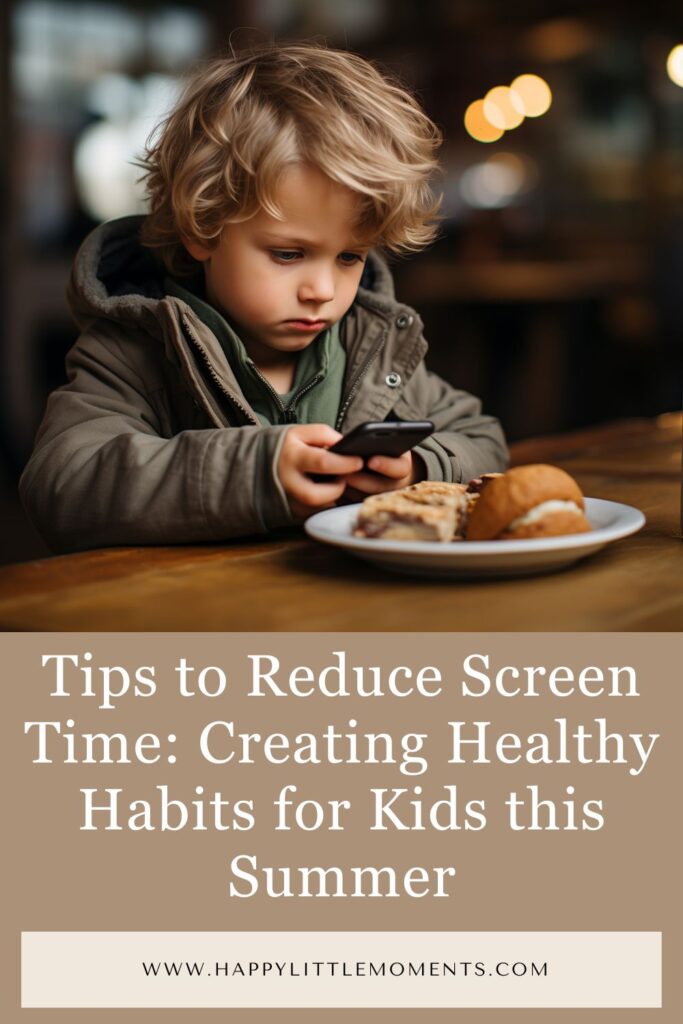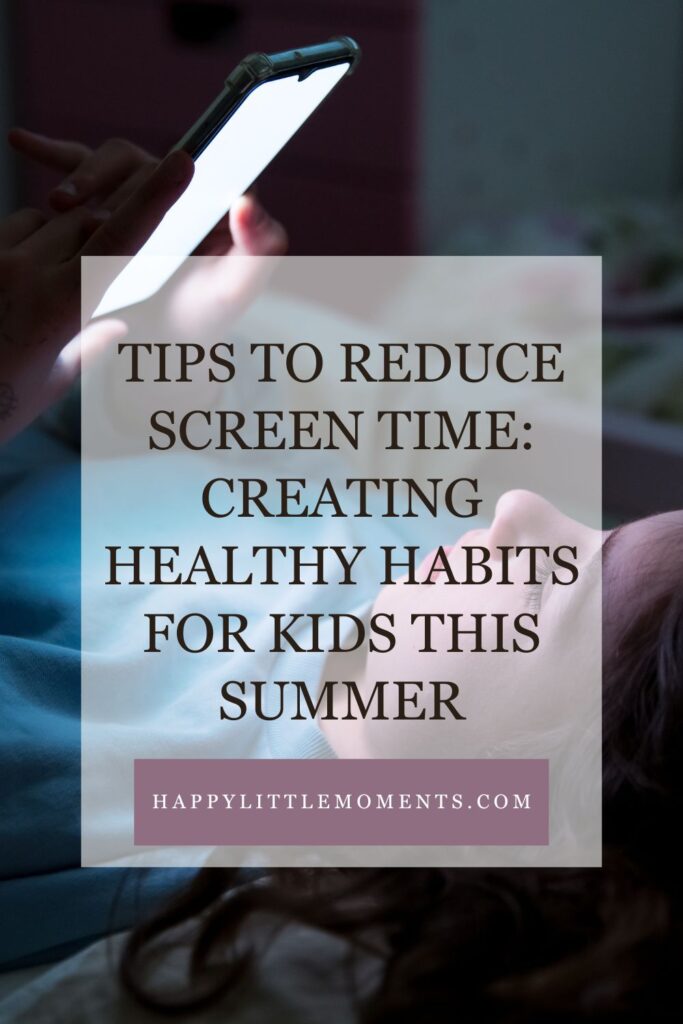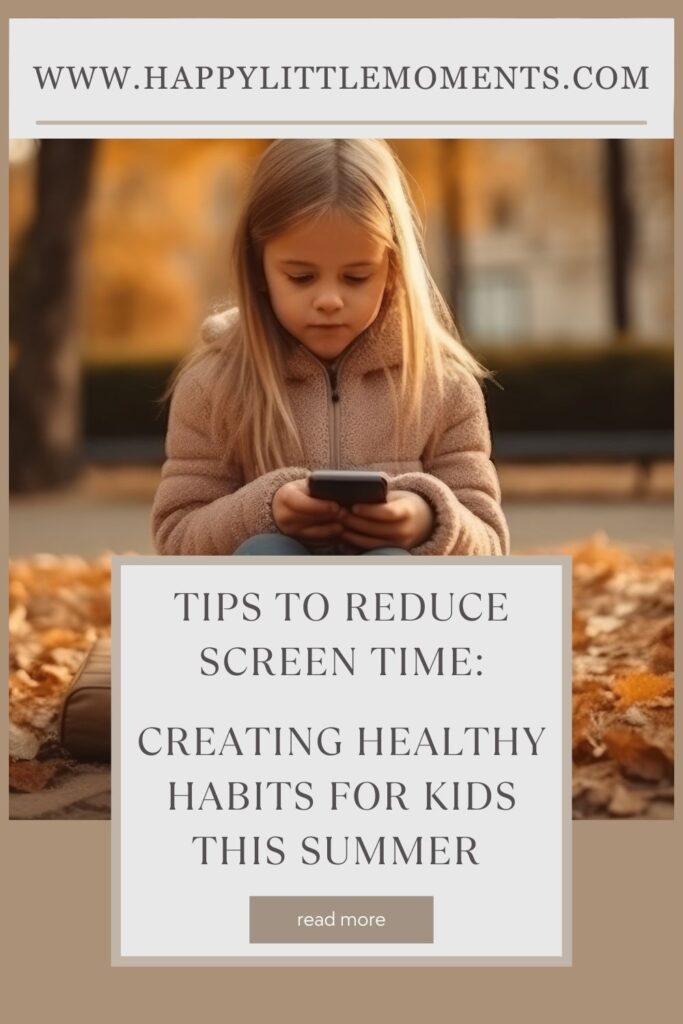Tips to reduce screen time: Creating healthy habits for kids this summer
With summer break in full swing, it’s an excellent time to discuss tips to reduce screen time this summer. With kids home more, the temptation to allow increased screen time is strong. I’ll admit, I’m sometimes guilty of that. However, it’s important to consider what screens may be doing to our developing children’s brains.
our screen time story
When my daughter was 2 years old, I downloaded ABC Mouse onto my phone and tablet. I thought it was educational and fun, plus it allowed me to get things done around the house. However, my daughter became addicted incredibly fast. She would get completely engrossed in the game, and when the screen was taken away, she would have major meltdowns. Sound familiar? We tried limiting her time to 10-20 minute intervals, but the meltdowns continued. This made me question if it was healthy and safe for a 2-year-old. She constantly asked to play “mouse,” and it became an obsession. I wish I had tips to reduce screen time for children back then!
I don’t want to single out ABC Mouse specifically—it has some good, educational qualities for children, with adult engagement, and for very short periods of time. However, many current cartoons like CocoMelon and BabyBum can have a hypnotic effect on preschoolers and toddlers, as well. Something changes in our children when they get that glowing screen in their hands.
With my daughter, we made a tough decision. We took “Mouse” away until she turned 4, and when we reintroduced games, we set strict limits. She was allowed to play for 20 minutes at a time, once a day. This approach seemed to work for us. My oldest son had minimal exposure to phones or tablets until he turned 4, and our youngest, who is 1, has never used our devices. It’s a strategy that has helped us maintain a healthy balance.
The reality is, many of these games and shows are deliberately designed to be addictive and hypnotic for young children. This raises concerns about their safety for developing brains. This summer, let’s be mindful of screen time and seek a healthy balance for our kids.

What is Screen Time Doing to Children?
According to the book Glow Kids by Nicalous Kardaras, PhD, “Brain-imaging research shows that glowing screens, like those of iPads-are as stimulating to the brain’s pleasure center and as able to increase levels of dopamine (the primary feel-good neurotransmitter) as much as sex does. This brain-orgasm effect is what makes screens so addictive for adults, but even more so for children with still developing brains that just aren’t equipped to handle that level of stimulation…Perhaps most shocking of all, recent brain-imaging studies conclusively show that excessive screen exposure can neurologically damage a young person’s developing brain in the same way that cocaine addiction can.”
Yes, you read that right. Handing our children glowing screens can give them as much dopamine as sex, or when used excessively, causes their brains to resemble that of cocaine addict. I don’t bring up this problem to scare you or to even encourage you to take devices away entirely, but to make you aware of how powerful our electronics are to young, developing minds.
Screen Time Recommendations:
It is important to note the effects screen time may have on especially babies and toddlers. For example, according to the American College of Pediatricions, more screen time for children between 24-36 months of age resulted in worse performance on developmental screening tests given at 36 months. As it turns out, very young children don’t learn very well from screens, and they learn best from face-face interactions, exploring, and experiences.
- 0-24 months: No screen time recommended, with the exception of video chatting.
- 2 to 5 years: On average, less than 1 hour per day is recommended.
- 5 to 12 years: It is recommended that it be limited to less than 2 hours per day, preferably only high-quality programming.
- 13+: Parents and teenagers may work out their own screen time limitations together.
Tips to Reduce Screen Time this Summer
If you have not already introduced devices to your child, it may be wise to delay the usage of screens, such as phones and tablets, as long as possible. For those of us that have already exposed our children to screens, it can be difficult to reverse course. In that case, it’s more important for us to set some firm boundaries around the usage of screen time for our children:
1). Require that your child ask permission to use your phone, iPad, Nintendo Switch, tablet or other device.
2). Have strict parental controls set on any device they use. Young children aren’t purposefully looking for inappropriate material on the internet, but unfortunately, it is easily found.
3). Determine how long your child should be allowed on a screen each day, and if possible, set up their tablet to shut down after the allotted period of time.
4). Keep a close eye on what your children are watching and playing on their devices to make sure it aligns with your values and is not inappropriate for children.
5). Allow short screen time periods and set timers so everyone is aware of when to put the device down. Be clear about how much time you are giving them, and if possible, give them a transition warning 2-5 minutes before they are required to turn off the device. Having a transition period helps prevent meltdowns.
In our family, we have some strict boundaries around screen time. For example, during the week, our 5 and 6 year old children get 20-30 minutes per day in the evening while we’re getting dinner on the table. On the weekends, our children get no more than 1 hour of screen time per day, and screens are not allowed before 10:30 am or after 7:00 pm.
Other Ideas to Reduce Screen Time for Children this Summer:
If you’re not allowing your child to be on devices much over the summer, what else can they do? I’m so glad you asked! Let’s let kids be kids this summer! Here are some suggestions if you’re looking for ways to keep your little ones entertained!

Outdoor Activities
1). Encourage your child to spend time outside. Being outdoors boosts everyone’s mood, increases Vitamin D intake, and allows your child to explore and be imaginative. Children naturally want to be playing outdoors. If you don’t have a backyard for your child to play in, take advantage of nearby parks, and playgrounds.
2). Plant a garden with your child. I’ve never met a child that didn’t enjoy digging in the dirt and planting flowers with their parent. Plus, you’ll be able to spend time together caring for it, which teaches your child responsibility.
3). Explore the local attractions, such as the zoo, science center, museums, or botanical gardens.
4). Go for a hike at a park or a nature walk in your own neighborhood. Talk about the trees, rocks, leaves, birds, or anything else in nature that you see.
5). Play sports activities outside. Some of my children’s favorite toys are soccer balls, baseballs, footballs, and tennis balls.
Indoor Activities
6). Read books together. Who couldn’t use a cuddle? Curling up on the couch with books is one of my favorite ways to spend the afternoon with my kids! Plus, you’re nurturing their sense of adventure, wonder, and love of learning.
7). Build indoor forts together. Children love to have their own indoor forts and tents made of blankets, pillows, chairs, and tables. Get creative!
8). Paint, color, or do a craft together. There are so many craft ideas on Pinterest that can help you spend time together.
9). Teach your child to bake or cook this summer. Allow your child to help you meal plan, grocery shop, and cook with you. They’ll learn math, fine motor, and organizational skills along the way.
10). Pull out the board games and puzzles! This was a favorite boredom buster when I was a kid.
11). Try doing a science experiment together. Children love to see and understand the way our world works.
12). Encourage your child to play dress up and use their imaginations. My kids pull out the craziest clothing combinations from their dress up clothes. Sometimes, I’ll see a part cat, part ranger, part superhero emerge from our playroom.
13). Build with Legos or blocks and see where their imagination takes them.
14). Allow your child to help around the house. Young children thrive at being helpers. Teach them to fold or sort laundry, dust the furniture, or even sweep the floors with you.
Honestly, as a parent, we don’t have to constantly entertain our children all day every day this summer. It’s GOOD for your child to be bored sometimes. Our most creative times are when we are bored and using our imaginations.
In Conclusion
I hope these tips help you reduce screen time this summer. Most importantly, I encourage you to be mindful of your child’s daily screen time, monitor what they are exposed to, and establish clear boundaries. Encourage your children to engage in other activities this summer and watch their imagination and skills flourish!
Save this post for later! Click here to save to your Pinterest account. Follow me on Facebook, Instagram, and Pinterest for more great content!



